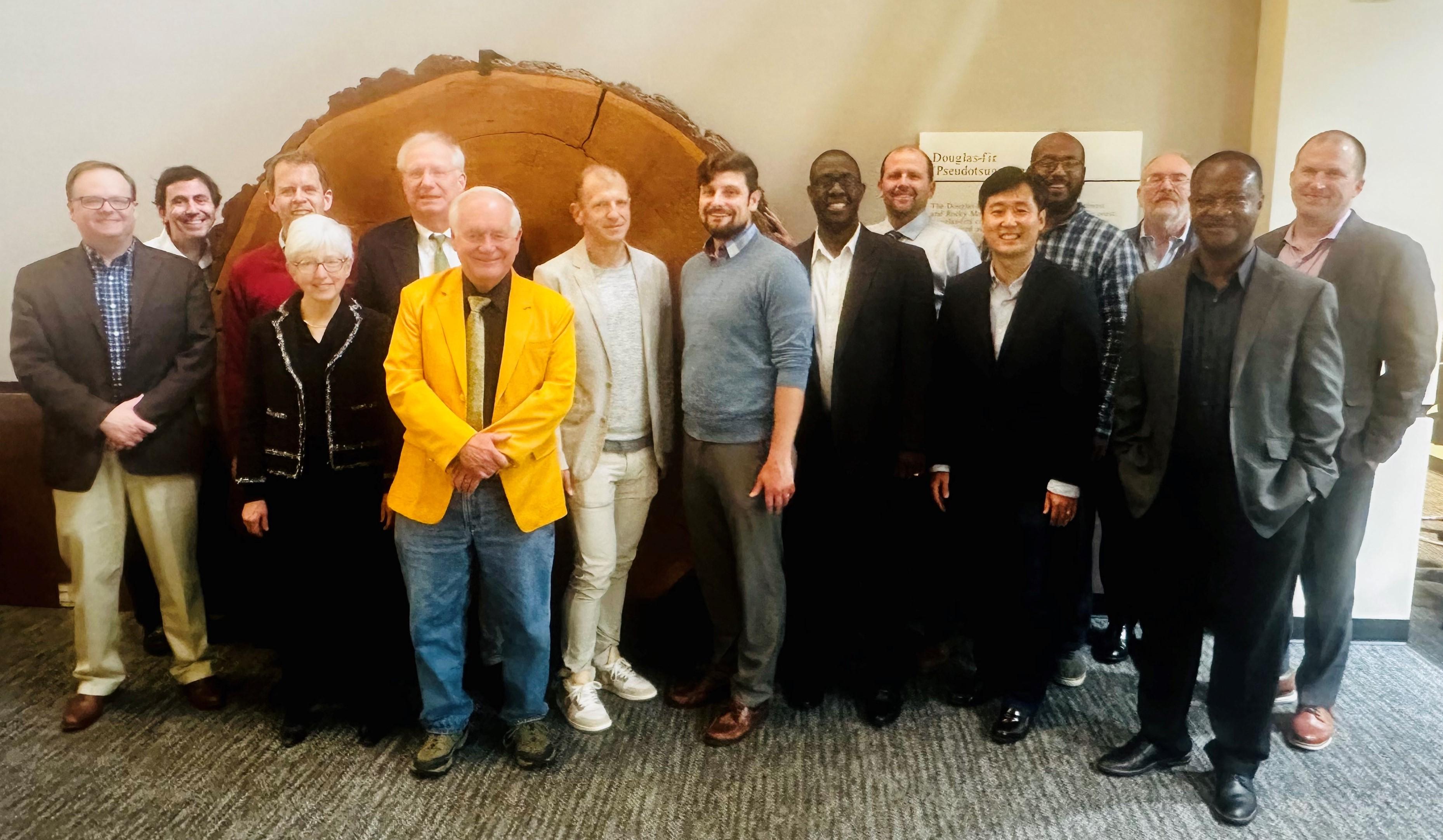Georgia Tech Launches Wood-Based Renewables Research Center
May 03, 2023 — Atlanta, GA

Team of ReWOOD research collaborators on launch day (Photo Credit: Terri Sapp)
The Renewable Bioproducts Institute (RBI) at the Georgia Institute of Technology has launched a new science and technology research center called ReWOOD. The ReWOOD launch included a 2-day workshop involving faculty research partners from universities across the Southeast, as well as former Georgia Agriculture Commissioner Gary Black.
ReWOOD, abbreviated from “Renewables-based Economy from WOOD” will focus on a burgeoning field of science called Xylochemistry. Xylochemistry makes use of sustainable plant-based raw materials to develop industrial products ranging from jet fuel to industrial solvents to generic pharmaceutical additives and more. Right now, most of the world production of such materials comes from non-renewable fossil resources or petroleum products. Moving to a renewable source will not only aid in reducing the dependence on fossil fuels but will also help with reducing the overall carbon footprint. ReWOOD is sponsored by RBI through its endowment-funded fellowships and is developing a corporate affiliate program.
“The formation of this internal research center will drive regional momentum for producing carbon neutral chemicals and fuels from wood wastes deriving from the abundant and fast-growing wood in the Southeast,” said Carson Meredith, executive director of RBI. “In fact, the Southeast has a larger percentage of sustainably grown working forests than any other area in the U.S., and Georgia is the number one exporter of forest products in the nation.”
Research on chemical renewables via Xylochemistry has been ongoing at Georgia Tech under a consortium called GT-STANCE (Science & Technology for a Neutral Chemical Economy). GT-STANCE’s researchers have developed seed technologies that aid in the production of wood-based chemical intermediates with potential uses in consumer commodities like pharmaceuticals and plastics. In addition, RBI has made a significant investment of nearly $3 million in building research teams in the related area of lignin conversion in the last five years. The formation of a research center that will coalesce regional thought leadership is the logical next step, as a renewables-based economy has become a national priority with the bioeconomy, climate, and clean energy goals set by the Inflation Reduction Act and the Bipartisan Infrastructure Law.
Raw materials for Xylochemistry could also be sourced from any kind of non-treated wood. For example, wood from demolished construction sites like old homes and wooden buildings provide an excellent opportunity for a circular economy, since this wooden construction waste ends up in landfills now.
Currently ReWOOD has 11 university affiliates that are joining Georgia Tech. In January 2023, faculty from Georgia Tech, the University of Alabama at Tuscaloosa, and Alabama A&M University convened to discuss the plans for a research center on a renewables-based economy from wood to develop renewable biofuels, industrial solvents, pharmaceutical additives, and many other products that culminated in the formation of ReWOOD. Since then, the center has gained the interest of multiple other researchers from the University of Florida, Kennesaw State University, and Clark Atlanta University. In addition, the Mississippi State and Forestry Office and Sandia National Laboratory have become key collaborators within ReWOOD. This collection of expertise includes chemists, engineers, economists, and forest experts, covering a broad range of activities that will include technology, economic, and workforce development, as well as lifecycle and socio-economic analysis. This partnership list will continue to evolve and grow as ReWOOD focuses on specific target research areas and proposals for funding to develop technology and processes in the business sector.
About the Renewable Bioproducts Institute at Georgia Tech
Georgia Tech’s Renewable Bioproducts Institute is one of ten campus interdisciplinary research institutes. RBI champions innovation in converting biomass into value-added products, developing advanced chemical and bio-based refining technologies, and advancing excellence in manufacturing processes. Our three strategic thrusts are circular materials, bio industrial manufacturing, and paper, packaging, and tissue.
RBI serves as a campus conduit for industry-university partnerships and provides a portal to Georgia Tech core laboratories, faculty and students whose work and expertise is focused on biomass and bioproducts.

ReWOOD launch at the Renewable Bioproducts Institute on April 27, 2023 (Photo Credit: Terri Sapp)
Priya Devarajan | RBI Communications Program Manager




